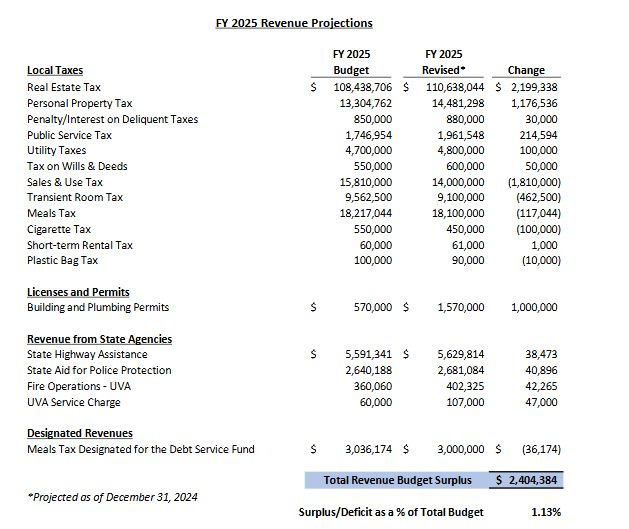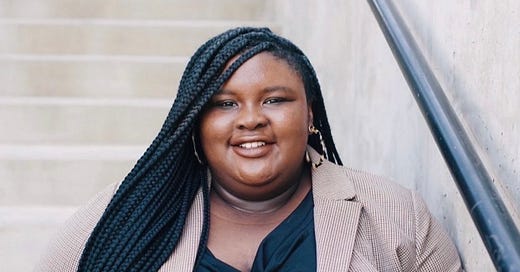February 20, 2025: Zyahna Bryant enters race for Charlottesville School Board
Plus: Developer wants Council to weigh in on height of downtown building
On any given day you can go to Wikipedia and review items that have happened in history. For instance, the legislature of the Hawaii territory met for the first time on February 20, 1901, though there’s no specific citation given. Four years later, the U.S. Supreme Court upheld a smallpox vaccine mandate that Massachusetts had put into place in 1855. That one does have a source.
On this day in 1933, the U.S. Congress voted on a Constitutional amendment to end prohibition. That same day, Adolf Hitler met with German industrialists for support for the Nazi party’s election campaign for the election weeks later. Charlottesville Community Engagement depends on access to well-documented information and comes from a long tradition. I’m Sean Tubbs, determined to advance the cause of a free society.
In today’s installment:
Zyahna Bryant has filed paperwork to be on the Charlottesville School Board
Charlottesville City Manager Sam Sanders is not in a hurry to appropriate the $22.4 million surplus for FY24 due to concerns about cuts in federal spending
Two Charlottesville City Councilors honor the late Satyendra Huja
Several people are appointed to boards and commissions in Charlottesville
Developer Jeffrey Levien appears before City Council to seek a decision on whether he can build a 184 foot tall structure at the site of the Violet Crown
So far, Governor Glenn Youngkin has not taken any action on bills sent to him by the Virginia General Assembly, but there’s a summary of some of what is pending
First-shout: Dawn Porter to address Emily Couric Leadership Forum on April 10
On April 10, the Emily Couric Leadership Forum will award $250,000 in scholarships to area high school women in recognition of leadership excellence at its annual Luncheon at the Omni Resort in Charlottesville. They anticipate a sell out for this year’s luncheon.
This year’s speaker and recipient of the Forum’s Women’s Leadership Award is Dawn Porter, an award-winning documentary filmmaker known for her storytelling on social justice, history, and cultural icons. Her celebrated documentaries have aired on HBO, Netflix, CNN, and PBS. Many of her films elevate marginalized voices and illuminate U.S. history’s lesser-known stories.
If the event does sell out, there will be a wait-list and the event will be live-streamed!
To find out more, please visit the website at www.emilycouricleadershipforum.org
Zyahna Bryant files paperwork to run for Charlottesville School Board
A woman at the center of a petition to remove Confederate statues from two Charlottesville parks has launched a bid to run for the city School Board.
“Our communities need us now, more than ever,” said Zyahna Bryant in a press release. “I believe in pouring back into the people, places and things that we value the most.”
Bryant will hold a launch party for her campaign at 4:30 p.m. on March 1 at the Jefferson School African American Heritage Center. The release states that the event will provide additional details on her platform and a chance to talk about the future of the city’s public schools.
“As a proud alumna of Charlottesville City Schools, I understand it to be necessary to empower the voices and visions of those who are from this community,” Bryant continued.
When she was a student, Bryant started a petition in 2016 to remove the statues which eventually happened in the summer of 2022 after a court battle.
Bryant filed a statement of organization with the Virginia Department of Elections on January 30. She’s also launched a campaign website.
There are three seats up and incumbents Emily Dooley and Lisa Torres have both announced they would seek re-election. Dashad Cooper has also filed paperwork. The other incumbent, Dom Morse, has not yet indicated his plans.
Sanders not in a hurry to appropriate Charlottesville’s FY24 surplus funds
On Tuesday, Charlottesville City Council approved the second reading of a resolution to place a $22.4 million surplus from fiscal year 2024 into a contingency fund.
When asked by City Councilor Michael Payne for a sense of when the money would be allocated, Charlottesville City Manager Sam Sanders said he has no date in mind.
“At this moment I’m not rushing to prepare a recommendation,” Sanders said.
Sanders said that is because there is still much uncertainty about what federal funding is at threat of being withheld by a federal executive branch that is seeking to defund many programs. There have been several lawsuits, but so far the Trump administration is insisting they have the ability to circumvent the other two branches.
“We need to do some internal homework and that is underway to try and find out what are our federal resources that are within our current budget that are part of our proposed budget that I’ll be bringing to you on the Fourth of March,” Sanders said.
Sanders said the city may be able to use the surplus to offset potential reductions, but he also warned that some programs may need to be cut. He said he did not want to alarm the public because so far there is no certainty about what will happen.

City Council pays tribute to former Mayor Satyendra Huja
Charlottesville City Council paid tribute this week to the late Satyendra Huja, a former Mayor who was once the city’s director of urban planning. Huja died on February 14 and his obituary has now been published.
Huja also taught for many years at the School of Architecture at the University of Virginia.
“I got to first know Mr. Huja as his student in 1988 and then we became friends and mentor and I’ll miss him dearly,” said Mayor Juandiego Wade. “When I got on Council I would go and visit him frequently and I let him know what was going on on Council and he was still educating me.”

Wade credited Huja for his work helping to form the Dogwood Housing, the downtown Mall, and Riverview Park.
The creation of the mall in the 1970’s was Charlottesville’s attempt to lure people downtown by turning a street into a public space. City Councilor Lloyd Snook said this version lasted because of Huja’s persistence.
“He understood something that people who have started pedestrian malls in other parts of the world hasn’t always understood which is that you don’t just start it in and forget about it,” Snook said. “You’ve got to get keep working on it. You’ve got to keep building on it.”
Snook said Huja helped bring about the construction of the Omni Hotel on the Downtown Mall on property that had been purchased by the Charlottesville Redevelopment and Housing Authority.
“He was instrumental in getting the Pavilion built,” Snook said.
A celebration of Huja’s life will be held Saturday, March 1st at 3:00 p.m. in the Unitarian Universalist Church on Rugby Road
Council appoints several to Boards and Commissions
At the beginning of their regular meeting on February 18, Charlottesville City Council appointed several people to boards and commissions.
Gareth Gaston was appointed to the Charlottesville Economic Development Authority.
Quinton Harrell was reappointed to another term on the Charlottesville Economic Development Authority.
Mary Ann Doyle and L.D. Perry were both appointed to the Human Rights Commission.
Isaiah Alvarez, Kyle Dobson, W. Andrew Frye, and Shenandoah Titus were appointed to the Police Civilian Oversight Board. Jeffrey Fracher was reappointed.
Hannah Brown and Meredith Keppel(?) has been appointed to the Tree Commission and Eric Bredder has been reappointed. The Belmont representative has not yet been selected.
Developer seeking new building at Violet Crown site appeals to Council
Charlottesville’s relatively new zoning code went into effect on February 19, 2024 and on the eve of its first anniversary, a developer seeking to construct an 184 foot tall building at 200 West Main Street appeared before City Council during the public comment period.
Jeffrey Levien of Heirloom Development has met with the Board of Architectural Review three times to get them on record as supporting demolition of the building that currently houses the very-open Violet Crown Cinema, as well as their guarantee he can build to the maximum height under the new zoning code.
A key component of the new zoning code is that discretionary decisions were to have been eliminated, but Levien pointed out what he sees as an obstacle.
“There’s a part of the code that gives the BAR zoning review rights,” Levien said. “It’s a safeguard I guess that allows them to drastically change massing. It can cut down height, it can require stepbacks, and basically determine whether a project can go forward or not.”
That part of the code relates to the Downtown Mixed Use zoning which can be found in section 2.10.9 which governs building height. In what’s known as DX, “the maximum height is determined based on BAR review using their design guidelines.”

Levien said after spending time with city staff, he has come to the conclusion that the BAR can’t set binding conditions for their approval the way the code is currently set up.
“I’m here asking for your help, please, to be able to put a stake in the ground as to what this envelope can be and it’s important for me to say envelope because it’s just the massing,” Levien said. “None of this circumvents zoning review, city engineering review, or anything else.”
Levien asked Council to take action, but it is unclear if what he asked for can happen under existing Code. The three times he appeared before the BAR was for a preliminary discussion.
In January, Levien filed two requests with the city for 200 West Main Street. Though he is not the owner, he has a contract to purchase the site which allows him to submit land use applications.
One request is a special exception to ask for relief from a requirement from something called active depth defined as “the horizontal depth of a building that must contain active spaces.”
The purpose of this is to “facilitate the creation of a convenient, attractive, and harmonious community by minimizing the impact of inactive spaces on the public realm and to promote a comfortable, safe, engaging, and attractive build environment.”
In the DX district, this requires a minimum of 30 feet for primary streets and 15 feet for secondary streets.
In materials filed on January 28, Levien argued that requirement would take away space necessary to build parking for an apartment building.

On February 6, Zoning Administrator Read Brodhead sent a letter explaining the submitted materials were not sufficient for review by the city.
“Development Code Section 32-5.2.15.B.1 requires the applicant to schedule a pre-application conference with the Administrator to discuss the procedures, standards, and regulations required,” Brodhead wrote.
There are currently no further documents related to that request. Under the new Development Code, special exceptions go through the Planning Commission for a recommendation with final approval by City Council. These meetings are to be public, but a formal public hearing is not required.
Heirloom’s second application is for a request for a Certificate of Appropriateness to demolish 200 West Main Street. The materials include a 12-page letter from Bob Pineo of the group Design Develop who writes that the new Development Code offers a chance for the city to build a “more dynamic, inclusive, and sustainable urban fabric.”
“”We propose the demolition of 200 West Main, making way for a project that aligns with the city’s stated goals of density, diversity of uses, and forward-thinking urban design,” Pineo wrote.
Pineo also noted that the BAR has approved demolition of other nearby structures such as the Studio Art Building at 1106 West Main Street that was knocked down to make way for the Draftsman. Also gone is the former Escafe restaurant at 215 West Water Street, as well as 210 West Market and 210 West Market.
“The land at 200 West Main Street represents a similar opportunity as those sites, offering the chance for increased density and vitality downtown,” Pineo wrote.
(In full disclosure, Design Develop pays Town Crier Productions $25 a month Patreon contribution. That’s why you see shout-outs from time to time.)
The Board of Architectural Review was to have taken up the demolition request on February 19 but the meeting was canceled due to winter weather. It will now be held on February 26. You can take a look at the materials here.
The Violet Crown is still operating as a business and a request for comment is pending.
After Levien finished his comments, Mayor Juandiego Wade responded.
“We are discussing it as Council,” Wade said.
When asked via email for clarification, Wade said he has had individual discussions with Councilors but no formal discussion.
In January, Neighborhood Development Services Director Kellie Brown presented Council with her department’s proposed work plan for the rest of the year. One of the items coming up is a study of downtown heights in the downtown area. At that time, she did not
“Does the development code really provide guidance for building height, building form on the mall in a way that kind of provides clear expectations for everybody?” Brown asked. “Or is there maybe some additional work we could be doing to kind of clarifying what is the shared vision for building height and form on the Mall?”
That discussion is not yet scheduled to happen. Stay tuned.
Second Shout-out: shout: WTJU’s Offbeat Roadhouse features Brookhouse this Friday!
Every Friday night at 8 p.m, Offbeat Roadhouse on WTJU invites a different musical group into your home for an hour long concert live from WTJU’s performance space. Each week there will be Blues, Folk, Jazz, and Roots acts from around the globe.
Brookhouse will pull into Offbeat Roadhouse Friday night, February 21, for a concert which will also be broadcast on WTJU. Brookhouse mixes rock, latin jazz, and americana in a way that only the son of a Cuban-American and a lifelong Virginian could. Acoustic and electric, English and Spanish, earnest and mysterious, Brookhouse celebrates the mixing of cultures–and emotions–to bridge cultural divides and demonstrate that we all contain multitudes.
This is a free event, open to all. You can also listen to Offbeat Roadhouse on the radio (91.1 FM) or on-line, and even video stream it at WTJU’s Facebook page or YouTube channel. But concerts always sound better with you as part of the studio audience. WTJU is located at 2244 Ivy Rd in Charlottesville, right next door to Vivace.
Take a look:
Virginia General Assembly nearing completion of 2025 session
The legislature for the Commonwealth of Virginia is expected to adjourn on Saturday, ending a session whose beginning was delayed by a water crisis in Richmond.
Delegates and Senators have been busy this week. On Tuesday morning, 1,425 bills had passed the House of Delegates. That number was up to 1,723 this morning The Senate has been just as productive in that time period from 1,046 to 1,418.
Hundreds of these bills are uncontroversial resolutions to express support for various individuals, organizations, concepts, and occasions. One of these is to recognize Virginia History Day, a program of the Virginia Museum of History & Culture that culminates in an academic contest for students in grades four through 12. This year’s theme is Rights and Responsibilities in History.
HJ695 was approved by the House of Delegates on a voice vote on February 18 and awaits action in the Senate.

This week has seen more legislation sent to Governor Youngkin’s desk for action. For instance, a bill from Delegate Marcus Simon (D-13) would make it a Class 6 felony to place a Nazi swastika in a public place or on a highway with the intent of intimidation. This amends existing law and also adds a disclaimer that the use of the symbol by some religions is not included. This passed the Senate with 36 ayes vote on February 14 and the House on February 18 with 97 ayes.
Land use and housing
HB2037 would allow localities to add language to their land development ordinance to require applicants to install solar canopies over parking lots with more than 100 spaces. This passed the House of Delegates on a 64 to 32 vote. The Senate adopted an amended bill on Februay 12 on a 21 to 18 vote. The House agreed to those amendments on February 14 on a 62 to 34 vote.
HB2781 which would give Prince William County the same power Albemarle County has to adopt policies to require developers to designate some units as affordable. Technically the legislation would allow all localities with the County Executive form of government to have this power, and there are only two. This passed the House of Delegates on a 71 to 25 on February 4 and the senate on February 17 on a 23 to 16 vote.
HB2744 would state the official policy of the Commonwealth of Virginia is to reduce heating costs for low-income residents and require Appalachian Power Company and Dominion Energy to assist. This passed the House on February 4 on a 67 to 31 vote and the Senate on a 22 to 18 vote on February 19.
HB2533 would clarify that comprehensive plans in all localities can recommend policies to allow tiny homes and accessory dwelling units. This passed the House with 96 ayes on January 30 and the Senate on a 25 to 13 vote on February 12. The House agreed to the Senate’s amendments on February 14.

Governance
HB2165 would prohibit the use of campaign finance revenue to be converted for personal use. This passed the House on February 4 with 97 ayes and the Senate on February 19 with a unanimous vote of all 40 Senators.
HB2764 would lift a prohibition on collective bargaining by public employees. This passed the House on February 4 on a 51 to 46 vote and the Senate on February 19 on a a 21 to 19 vote.
HB2668 would allow Electoral Boards across Virginia to remove one of their members on a ⅔ vote after a public hearing on the matter, and allow an Electoral Board to dismiss the registrar on a unanimous vote after a public hearing. In Virginia, these bodies all have three members. This passed the House of Delegates on February 4 and the Senate on a 21 to 15 vote.
HB2517 would allow institutes of higher education to be example from permitting requirements if they want to apply sewage sludge on their own land for the purposes of a research project. This passed the House on an 82 to 17 vote on February 4 and the Senate passed an amended version on February 14 with 36 ayes. The House agreed to those amendments on a 94 to 3 vote on February 18.
HB2056 would allow localities to set up satellite offices for absentee voting. This passed the House on a 53 to 45 vote on February 4 and the Senate on a 21 to 14 vote on February 14.
HB2531 would require the Virginia Employment Commission to set up a paid family and medical leave program. This passed the House on February 4 on a 51 to 47 vote and the Senate on February 12 on a 21 to 18 vote
The next such report will come out after the General Assembly adjourns. There’s a lot of other sources out there for such report. Share the one you like?
Reading material for #816
After 6 months of decline, average rents rise again, Mary Salmonsen, Multifamily Dive, February 18, 2025
Trump administration moves to end New York City's congestion pricing, David Shepardson and Julia Harte, Reuters, February 19, 2025
Monticello hosts series of special events to remember Black history, Cecilia Mould, Cavalier Daily, February 19, 2025
As more Amish move into rural Virginia, crashes between buggies and motor vehicles are on the rise. Finding a solution is complicated, Ralph Berrier Jr., Cardinal News, February 20, 2025
Whither #816?
I almost kept going into the next story which would have been on an economic forecast for the city. Then I realized it was almost 3 p.m. and I’m already close to 3,000 words.
I didn’t expect one of today’s main stories would be on the proposed replacement of the Violet Crown with a 184 foot tall apartment building. I’ve written several stories about that specifically, but did not write up the third discussion. Neither did anyone else.
Is there really a point to writing these stories when no one else seems to have the same appetite for detail? I think the answer is yes, because more people keep paying but there are still so many meetings I’ve not gotten to yet. I’m going to have to figure out how to train people who want to be journalists.That’s going to take defining what I do and what makes it different from public relations and sales.
I’ve taken the first step toward this by reconnecting with my alma mater. I want to teach research skills and put them to work. I want to come up with a program where I can work with journalism professors across the area to find students who may want to learn how to do what I do.
It’s not for everyone. But, I am genuinely humbled by the number of people who thank me for the work I do. Every single time I hear that, I silence the doubt and get to work.
I also need policies in place such as something that offers a further explanation when someone who is advertising suddenly shows up in a story. That happened today and I didn’t expect it. I don’t see any need to end the arrangement, but I do see the need to make clear that no one who advertises with me gets any influence over what I publish.
Anyway, on to the next one which may be different. Tomorrow’s edition will feature at least one campaign announcement but may very well be a long capturing of tomorrow’s State of the Community event. I’ve not done a lot of audio this week, and the WTJU radio show needs to be produced.
Please keep paying attention. Please get hungry for information. And please accept this cover of a Rolling Stones song by one of my favorite bands of the early 1990’s.





